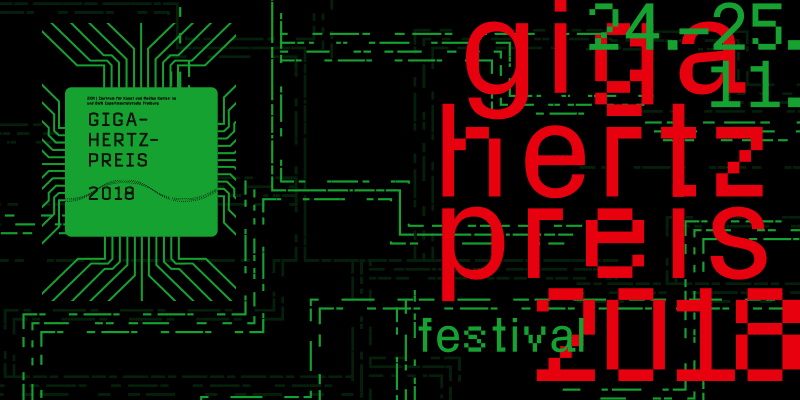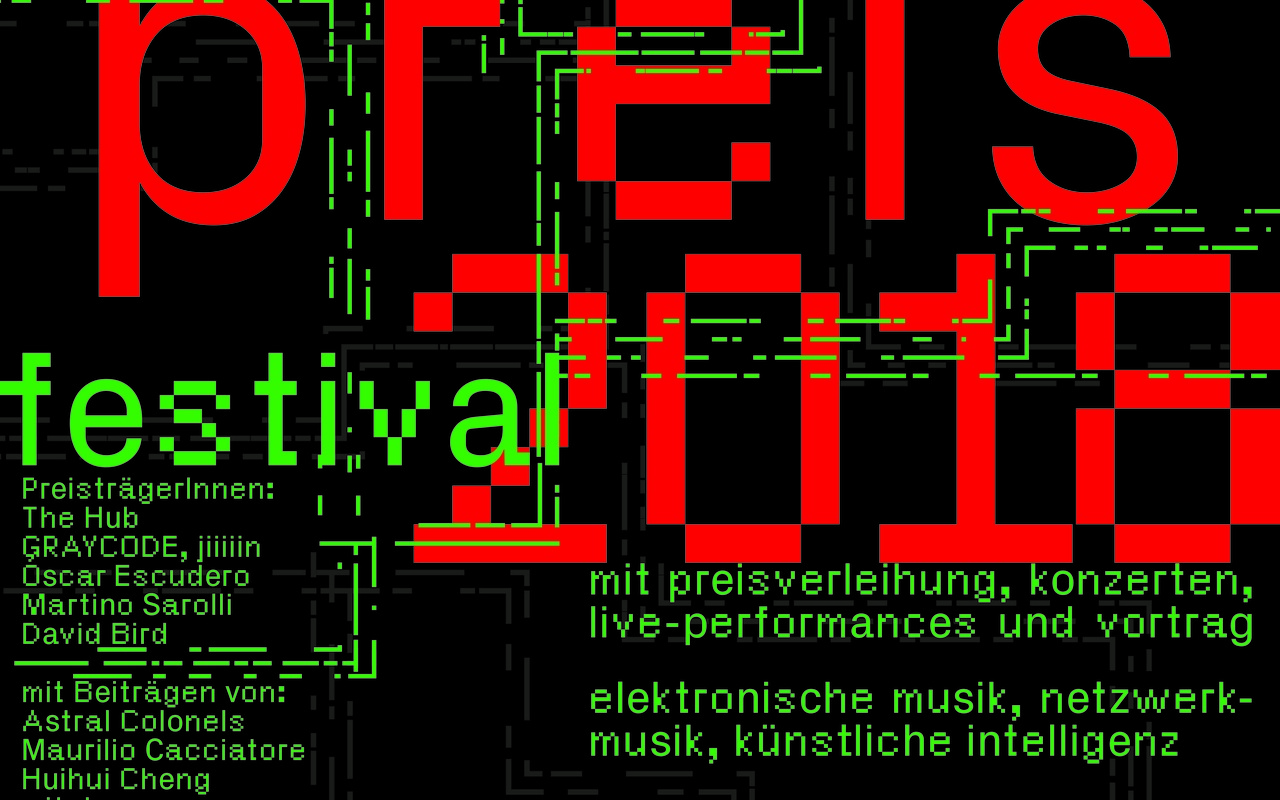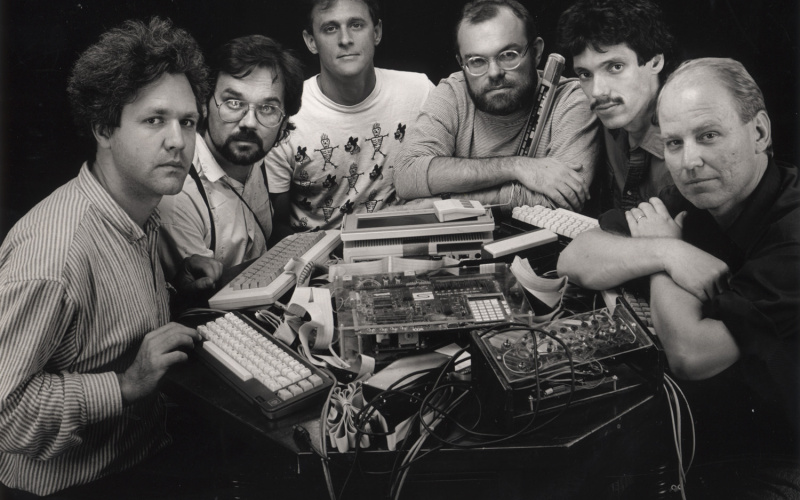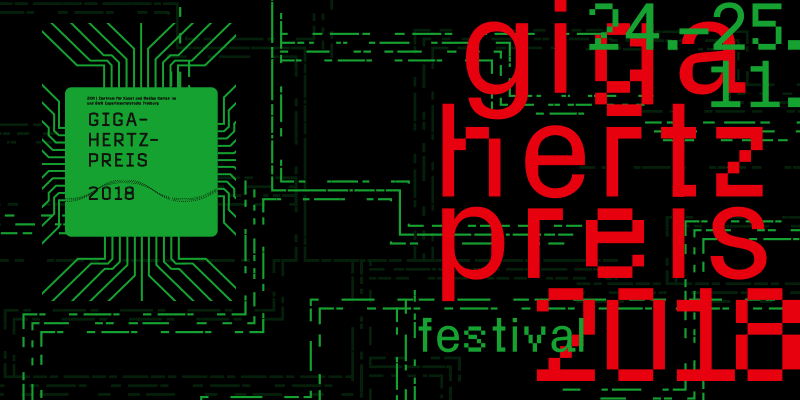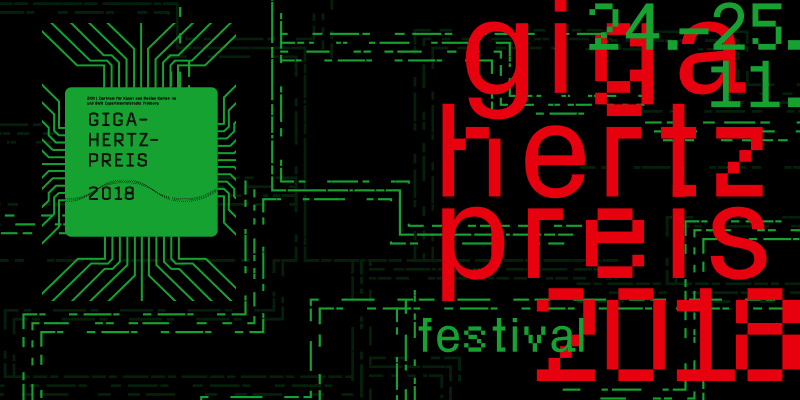- Event
- Festival
Giga-Hertz Award 2018
Sat, November 24 – Sun, November 25, 2018
- Location
- Media Theater
- Cube
- Music Balcony
ZKM and the EXPERIMENTALSTUDIO of the SWR have been awarding the Giga-Hertz Award for electronic music since 2007. In 2018, the prizewinners will again be celebrated with concerts, performances and award ceremonies as part of a two-day festival.
This year, visionaries from the fields of »Network« and »Live Coding« as well as for the first time from the field of »Artificial Intelligence« will be honored.
In addition to the festive award ceremony followed by a reception, the production prize winners of recent years will perform performances and concerts.
The Giga-Hertz Award is dedicated to the world-famous physicist Heinrich Hertz (1857-1894). He taught at the Technical University of Karlsruhe (now known as the Karlsruhe Institute of Technology) at the end of the 19th century and discovered electromagnetic waves there. The objective of the award is to promote electronic music and to provide an impetus through new tonal and compositional possibilities.
Retrospective Thoughts on the Giga-Hertz Award
-
by Peter Weibel
G. W. Leibniz, we owe the insight that »music [...] is a hidden arithmetic exercise of the spirit unconscious of its counting« (1712). In other words: music is a mirror of the mind. Leibniz alludes to the well-known pythagorean music theory, which states that numerical proportions and the corresponding vibrations form the physical basis of music. If Leibniz also refers to the human mind, which transforms arithmetic practice into music, then this is in a sense an anticipation of Hermann von Helmholtz's research (Die Lehre von den Tonempfindungen als physiologische Grundlage für die Theorie der Musik, 1863).
By relating the function of the tenses as a form of expression of music to the electrical activities of the brain, the physiological foundations could be decisively expanded to include knowledge of neurophysiology and neuro- and cognitive sciences. The transdisciplinary combination of music, computer and brain research forms a central foundation for current explorations into the universe of sound, with the universal triad of »Music, Mathematics, and Mind« becoming the subject of new theories and practices especially since the emergence of the computer. The impressive artistic and scientific achievements from Marvin Minsky to Manfred Clynes as well as those from Maryanne Amacher to Ryoji Ikeda testify to the excellent development spectrum of new computer-based composition methods and instruments that liberated sound and opened up new sound horizons.
In a similar way, the series of Giga-Hertz Prize winners, which has been continuing continuously for more than a decade now, depicts the cosmos of electronic sound in an almost encyclopaedic, cross-generational and cross-genre way. The works of the main prize winners since 2007 – Jonathan Harvey, Trevor Wishart, Jean-Claude Risset, Gottfried Michael Koenig, Pierre Boulez, Emmanuel Nunes and Pauline Oliveros, John Chowning and Francis Dhomont, Pierre Henry, Brian Eno, Curtis Roads, Laurie Anderson and The Hub – document the evolution from ring modulator, synthesizer and frequency shifter based music to net, neuronal, and molecular based music performances. Through the use of new software, hardware and sophisticated interfaces, which continue the so-called »Sentic Cycle« (by Manfred Clynes), music can be created by means of haptic displays and a control system controlled within magnetic fields.
The fact that acousmatic music, which is at the centre of the Giga-Hertz Prize in honour of Heinrich Hertz, who proved the existence of electromagnetic waves in Karlsruhe between 1886 and 1888, has long enjoyed worldwide recognition, is impressively illustrated by the long list of production, promotion and special prizes. The praise that the ZKM has developed into a metropolis of acousmatic music manifests itself in the continuity of the Giga-Hertz Prize and this year's excellent prizewinners.
-
by Detlef Heusinger
In 1913 Max Weber postulates in a treatise on the basic concepts of sociology the »disenchantment of the world«, caused by the capitalist structure of society and the associated mechanization and rationalization of what was previously considered a miracle. A few years later, Lew Termen invented the theremin named after him, (for a long time) the only musical instrument that is played contactless and generates electronically generated sounds. The fact that it is precisely this magic instrument that heralds the »birth« of electronic music to this day, to which pure rationalization is commonly attributed, is a fine antagonism of music history. When John Cage, just 18 years old, visited Berlin in 1939, he attended a phonograph concert by Paul Hindemith and Ernst Toch, which had previously been recorded on stage and played spoken music from phonetic syllables. Inspired by this, he wrote not only Imaginary Landscape No 1 for muted piano, cymbal and turntable with variable speed, but also a manifesto with the following hypothesis: »I believe that the use of noise and noises in making music will continue and increase until we come to a music that is produced by electrical instruments that have every conceivable and audible sound ready for musical use«. We have long since reached the noise in music, as in the world in general, but to find or preserve the magic inherent in music as well as to invent the previously unheard-of, may the Giga-Hertz Prize continue to promote it for a long time to come.
Preface
-
by Ludger Brümmer
The eleventh edition of the Giga-Hertz Award is characterized by two special features. With The Hub, an ensemble is honoured that stands out due to its rather extra-musical quality: it works with networks and was the first band to perform a telematic performance 31 years ago, in 1987. Furthermore, for the first time, we have chosen Artificial Intelligence as an optional theme for the submissions. Network and AI – the latter also represented by networks, more precisely by neural networks – also form the future research focal points of the Hertz-Lab, which emerged from a merger of the ZKM | Institute for Music and Acoustics with the ZKM | Institute for Visual Media. This theme represents something typical for many contemporary themes in art: they are not linked to a specific genre. While harmony and color theory clearly aim at sounding or luminous perceptions, artificial intelligence can articulate itself both musically and visually. Networking can also be applied as a communication strategy to many areas of art, technology or society. Researching these meta-aspects of technologically active art, developing them further and applying them will not only be the task of the Hertz-Lab, but will also flow into the thematic fields of the Giga-Hertz Award.
Special Award Artificial Intelligence 2018 | Martino Sarolli (Italy)
The Special Prize for an AI-related work is given to Martino Sarolli for his work »Lapidario_E01«. This is the first half of a distich about mineral life, conceived as a multi-channel piece for live electronics. Sarolli uses state-of-the art machine-learning technologies to re-synthesize a complex sound material under live control. »Lapidario_E01«, on the theme of silicon crystals - the very basis of computer technology - is composed by a human, but combines the best of both worlds. It is elegant, organic, and powerful.
– Author: Palle Dahlstedt
Program
Saturday, November 24, 2018
| 7 pm | Giga-Hertz Award ceremony
| Media Theater | ||
| following | Concert of the award winners 2018
| Cube |
Sunday, November 25, 2018
| 4 pm | Lecture of the Giga-Hertz main award winners 2018 with subsequent conversation | Cube | ||
| 6 pm | Concert of the winners 2016 and 2017 with presentation of the works of Elvira Garifzyanova and Daniel Zea (2016) created by the production prizes and Maurilio Cacciatore (2017) | Cube |
Flyer
Flyer
- ghp_poka_2018_dinlang.pdf (1.69 MB)
Program
Program
- ghp_ph_2018.pdf (10.14 MB)
Project Team
Ludger Brümmer (Artistic Direction)
Dorte Becker, Sophie Caecilia Hesse (Project management, program brochure)
Benjamin Miller, Anton Kossjanenko (Sound engineer)
David Luchow (Sound technician)
Anton Kossjanenko (Sound recordings)
Hans Gass, Manuel Weber, Hartmut Bruckner (Light and event technology)
Christian Berkes, Marco Kempf, Manuel Urrutia (Hands Light and event technology)
Jury
Ludger Brümmer (Composer, Head of ZKM | Hertz-Lab)
Christiane Riedel (Managing Director of ZKM | Karlsruhe)
Alexandra Cardenas (Composer, Improviser, Programmer)
Detlef Heusinger (Artistic Director of SWR Experimentalstudio)
Palle Dahlstedt (Composer, Professor for »Art & Technology« at Aalborg Universität)
Björn Gottstein (Muscologist, Artistic Director of Donaueschinger Musiktage)
